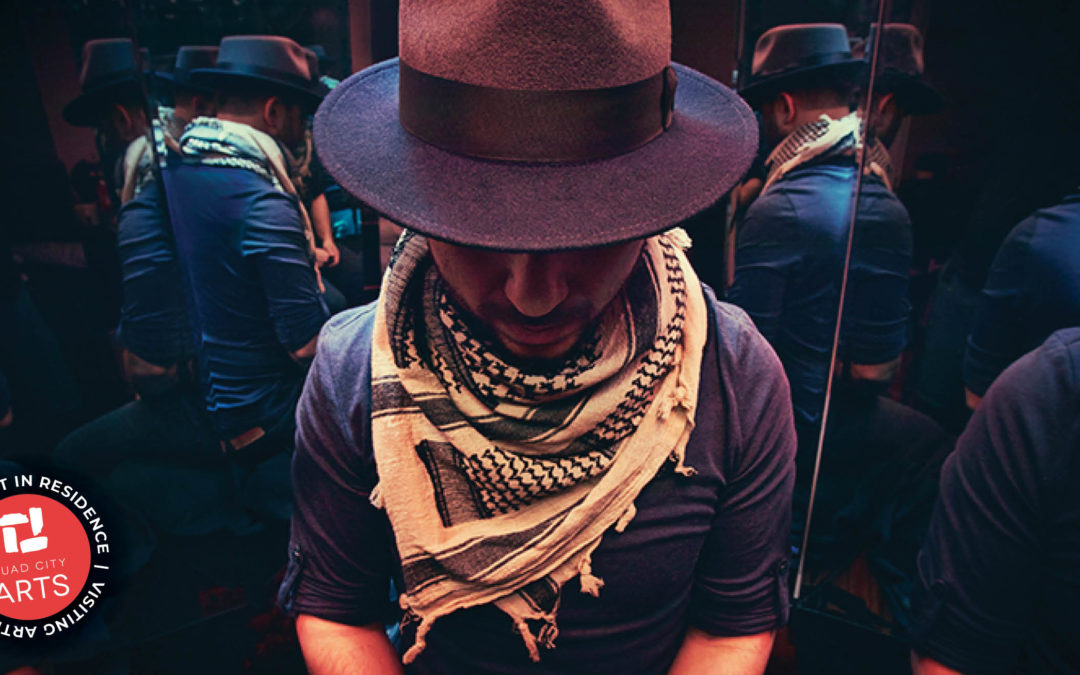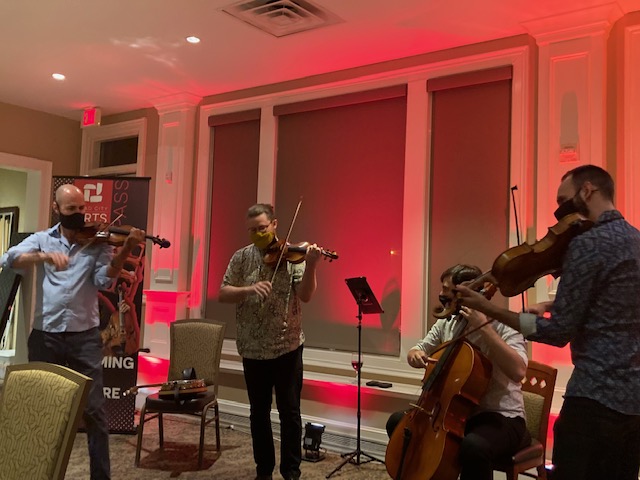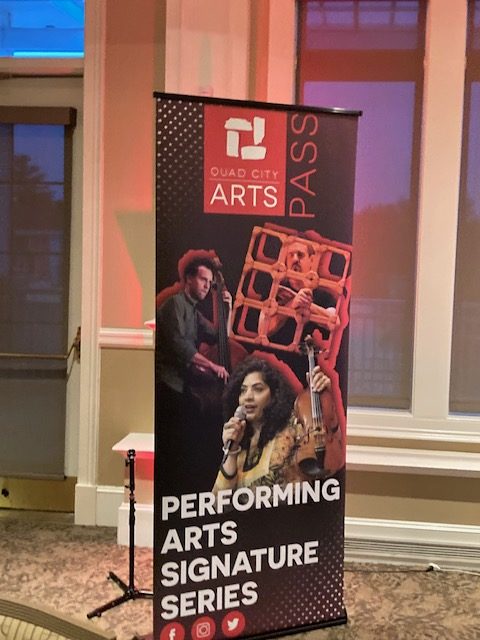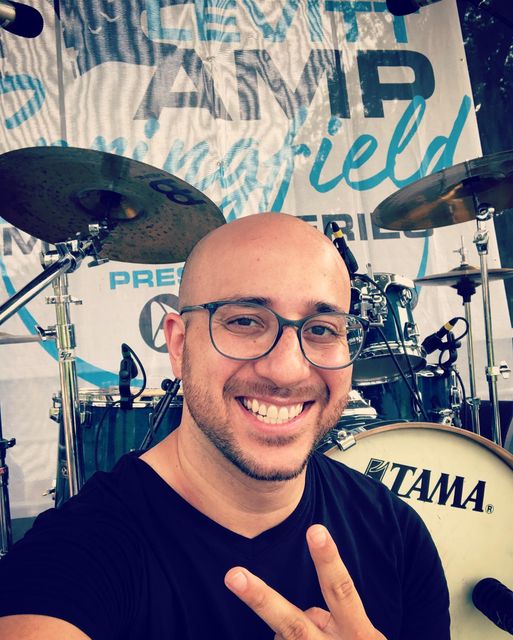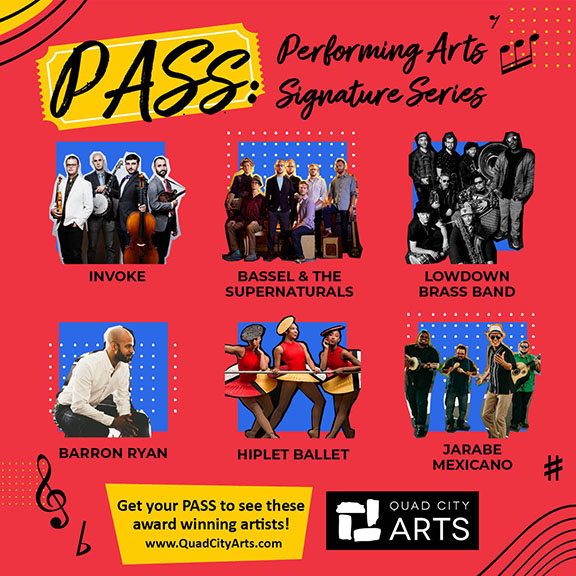The Quad City Arts Performing Arts Signature Series (PASS) is tailor-made for a unique, charismatic musician like Bassel Almadani, who has quite a story to tell.
The first-generation Syrian-American – born in Ohio – fronts the funk and soul band Bassel & The Supernaturals, the next Quad City Arts Visiting Artist (Oct. 18-21). Bassel & The Supernaturals will perform Oct. 20 at 7 p.m. at the Raccoon Motel (315 E. 2nd St., Davenport), and then an intimate PASS event on Oct. 21 at the Redstone Room (129 Main St., Davenport).
The PASS series consists of six events held each season from September – April that correspond with the Visiting Artist Series and outreach performances in area schools. This unique format provides guests with the opportunity for Q&A and up-close conversation with the artist. PASS events are held on weekdays from 6:30 p.m. to 8 p.m. at unique venues throughout the Q-C, so no two events are alike.
Tickets are $225 per person for the entire season / $140 per person for half-season, or individual tickets are available for $50 each. All proceeds benefit arts education and enrichment for over 30,000 K-12 students each year through the Visiting Artist Series program.
The remainder of the schedule for the 2021-22 PASS season:
- Bassel & the Supernaturals, Syrian-American funk & soul band, Oct. 21, Redstone Room, Davenport.
- Barron Ryan, contemporary pianist, Feb. 23, CityView Celebrations at Trimble Pointe, Moline.
- Hiplet Ballet, classical ballet/hip-hop fusion, Mar. 3, sponsored by St. Ambrose University, Rogalski Center, Davenport.
- Low Down Brass Band, brass ensemble, Mar. 24, sponsored by The Planning Center, Stern Center, Rock Island.
- Jarabe Mexicano, Mariachi/Rock Quintet, Apr. 7, sponsored by Grace Technologies in partnership with Mercado on 5th, Mercado in Moline.
A weeklong residency is relatively unusual for Bassel & The Supernaturals – which last played in Davenport in March 2019, at the old Raccoon Motel and a Daytrotter recording session.
“Something this deeply engaged with the community and having multiple events per day for like a week is kind of our first go at something that immersive,” Almadani said in a recent interview. “It’s exciting stuff. We’ve done so much of it in pieces that this will be really nice to have some room to breathe and lean into it within the community.”
“Getting to interact with students and adults makes touring and performing more meaningful,” Almadani said.
“It gives more meaning to the artistry when you can have a discussion around that and create a personal connection,” Almadani said. “It makes it such a multi-faceted experience, just like absorbing a performance or an opportunity to personalize it and ask questions, and realize — oh my gosh, they’re a person just like me and they were a student wow like it really helps to start connecting those dots. Those are the moments that remind any of us why we got into this in the first place.”‘
They released their new album in 2020 and promptly had all their tour dates canceled. So it’s been very gratifying to get back on the road this year, he said.
“It was tough. But once we finally got back up there on stage and started to feel that chemistry again, it’s oh, I can’t wait for this,” Almadani said. “Some days, it’s just exhausting, mentally and physically. And other days are just beyond meaningful and what we have a platform, to just be able to continue doing this when a lot of other artists can’t really say the same right now.”
Almadani is a first-generation Syrian-American who uses soulful melodies, funk-inspired grooves, and captivating lyrics to help shine a light on humanitarian issues and the modern-day challenges facing Syrians across the world.
Through his performances, songs, and records, he aims to bring light to the darkness surrounding the painful subject of the Syrian civil war, which started in 2010, has displaced millions of people and devastated the economy.
“And we’re talking about how we use art as a means to shine that light,” Almadani said. “It takes different shapes wherever we are — sometimes in the form of residency, a lot of times it’s in the form of just various concerts and a community engagement, or sometimes just rock and festivals. It’s always different.”
Almadani does residencies at universities and art centers, and to a lesser extent, high schools, middle and elementary schools.
“This a cool way to write the create that bridge with the students and help them see what it can be like, to actually pursue a path in the arts and do something with that,” Almadani said. “I think it’s intangible for a lot of younger students. I think it’s down to that as a potential path or outlook for themselves.”
He always shares his own personal, emotional story and uses that and music to connect with audiences.
“I am a Syrian person who is an artist. I work with musicians all over the country and tour all over the place to play emotionally saturated music that tells a story,” Almadani said. “I mean, sharing the personality and the character behind that is just as critical as the music itself.”
His family is from Aleppo, Syria – his father, immigrated to the U.S. in the late ’70s, and his mother a few years later. His father went to medical school in Syria and practiced as an OB/GYN in the U.S., delivering over 4,000 babies in his career.
His father first moved to Baltimore (his mother followed a few years later), where he did a medical fellowship, and later settled in northeast Ohio, where Bassel was born 33 years ago. Bassel graduated from The Ohio State University and lived in Chicago for ten years before moving to Lakewood, Ohio, a couple of months ago.
In January 2020, they released his song, “Aleppo,” in honor of his family’s hometown.
“Aleppo” is a disco and funk-inspired track celebrating the city featuring Arabian vocalist Ashkur and marked Bassel’s debut singing in Arabic. He said then: “The Western perception of Syrian and Arab cultures is too often associated with chaos. We are changing the narrative by highlighting the historical resilience and sustainability of our people.”
The song takes a lot of inspiration from Almadani’s workshops focusing on building sustainability through the arts. He and his wife partnered with the Karam Foundation to lead workshops at the Karam House, a community innovation center in Istanbul, Turkey, designed for Syrian refugee youth. Upon returning to Chicago, Bassel began a weeklong residency through the Inner-City Muslim Action Network (IMAN) as part of their Sacred Cypher Creatives program: a year-long fellowship including an Artist & Community Residency and Annual Retreat for artists working at the intersection of culture, social justice, and community.
A 2020 review at medium.com said that “Aleppo” features a “low-slung driving dynamic chock-full of radiant suffusions, as well as gently glowing vocal harmonies. When the horn section ramps up, the harmonics take on big band allure. ‘Relay’ oozes sinuous sensuality, both smoldering and suggestive, as soulful vocal tones bring erogenous heat to the lyrics.”
“Superbly wrought, Smoke & Mirrors delivers nuanced jazz tones, along with heady funk relish, providing a nonpareil listening experience,” the review of the album said.
Another piece in 2019 noted Almadani was not unscarred by the Syrian conflict.
“She’s lost, a part of the world today. Break off a piece of my soul and bury it underneath the ground,” he wrote in “Lost,” an elegy to his cousin, who had been shot and killed by a sniper in Aleppo.
“Lost” and other grief-driven songs about the war are found on his album “Elements.” The band donated more than 20 percent of their merchandise proceeds and $3,000 from their Elements preorder campaign to the Karam Foundation — a humanitarian relief organization that develops educational programs for Syrian refugee children, distributes Smart Aid to Syrian families, and funds sustainable development programs. They did the same for their 2020 record, “Smoke & Mirrors.
“Promoting humanity is key,” Almadani said in a recent interview. “We’re all living this human experience, and without my father, maybe a lot of my fans would not necessarily even be here.”
Rebranding and Restarting PASS
“The Performing Arts Signature Series originally started as Vanguard in the mid-1970s, with informal concerts and receptions at private homes,” Kevin Maynard, Quad City Arts executive director, said recently.
“Several years ago, the program was rebranded from Vanguard to PASS, mainly because not many people knew what Vanguard was,” Maynard said.
The last pre-pandemic PASS event was in February 2020, with Chicago Dance Crash. Every PASS artist is from the Visiting Artist Series, but not every VAS artist does PASS.
“One of the cool things about this event isn’t the food and the drinks. It’s once you see this performance – not a very long performance – it’s filled with conversation,” Maynard said. “The audience can ask questions. So the artist gets to tell the story of their experience in the schools and what questions they received. What people end up learning is there’s a lot of great things that happen with the Visiting Artist Series for the students, but a lot of these artists have great experiences as well.”
Though PASS events are more expensive, the artists typically do free or low-cost public performances in the community during their residency,” Maynard said. “There are plenty of options – a wide variety of price ranges and styles as well.”
The PASS programs spread across venues that are intimate and unique. “It varies over the year. Part of it is, the sponsors help dictate that,” Maynard said. “Like Mercado on Fifth, sponsoring for their new community center. Or the Rogalski Center, because St. Ambrose University is sponsoring Hiplet Ballet.”
In the fall of 2019, Heart of America sponsored one in their private airport hangar. “It was kind of cool to do that,” Maynard said. “Like, what’s a weird, unique venue to put an artist in? So we start making some phone calls.”
The PASS event often precedes the public concert (like with the recent quartet Invoke); however, Bassel & the Supernaturals will perform at the Raccoon Motel the night before the Redstone public concert.
For the four PASS events in early 2022, Quad City Arts emphasizes artists that local students wouldn’t be able to see usually.
“We want to give them something they may not have access to,” Maynard said. “That’s the key shift. Barron Ryan, in February, that dude is awesome. He’s charismatic; he’s a hell of a pianist. That’s going to be one of the best experiences for kids.”
“The fall has been tricky for the returning VAS, as more artists and schools are participating in the spring,” Maynard said. “PASS is geared to offer a wide variety of artists.”
Margot Day is the Performing Arts Director for Quad City Arts, who organizes the VAS (which usually has about a dozen artists over a school year). Karie Gilson, development director, puts together the PASS with six artists. They try to match appropriate artists with the suitable venues available.
Each artist performs about 25-30 minutes, as audiences enjoy complimentary appetizers and a cash bar and focus on interaction. Day tells each artist to be prepared for questions and for people to come up to them individually afterward.
“What’s different about this season is that all performers are from the U.S.; no international travel. We couldn’t guarantee that they could come in,” Day said, adding they focused on regional artists from the Midwest. However, Jarabe Mexicano is from San Diego, Calif., but is touring. Jarabe Mexicano is one of the artists that was postponed from spring 2020.
All PASS events support the Visiting Artist Series, a traditional year that reaches over 30,000 students.
Invoke (a genre-bending bowed and fretted string quartet) performed Oct. 6 at the Davenport Country Club for guests who enjoyed an evening of cocktails, hors d’oeuvres, and a spotlight performance followed by a Q&A with the artists. On Oct. 7 at 7 p.m., they performed a more formal concert (for free) at the Rust Belt Commons Area, 533 12th Ave., East Moline.
Karl Mitze of Invoke loved the PASS setting.
“If you can connect with people in a smaller, more intimate setting, then when you’re on stage in a big show and often I’ll find people and say, I met you the other night,” Mitze said. “I may have only known you for like a day, but you have more of an affinity with the crowd if you’re able to do that. Some places, you play one big show, and you may hang out in the lobby and then go home.”
“The community feels really nice,” Mitze said. “I don’t want to say this is unusual, but it’s definitely preferred.” PASS-like events can help increase attendance at public concerts, he said.
For more information on the artists or to purchase tickets, visit www.quadcityarts.com/pass.
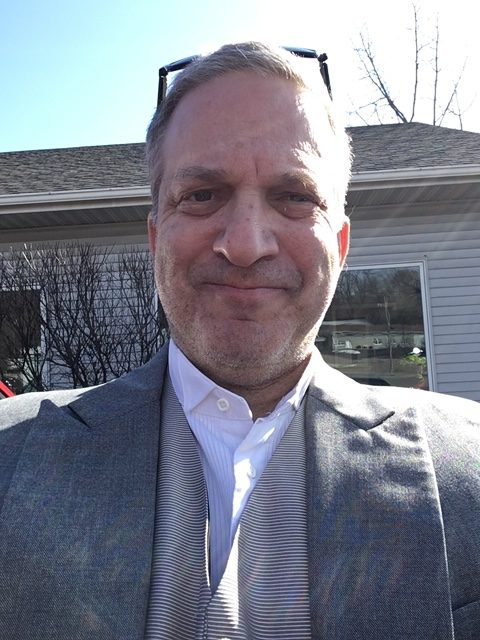
Jonathan Turner loves music and loves writing, so The Echo is a harmonious marriage of his twin passions. A pianist for 50 years, his undergrad and grad degrees are in music from Oberlin and Indiana, and he’s an accompanist for Zion Lutheran Church, Davenport. Turner has covered the Q-C arts and culture scene since 1995, including for the Dispatch-Argus and Quad-City Times, and for QuadCities.com and WVIK since March 2020.

